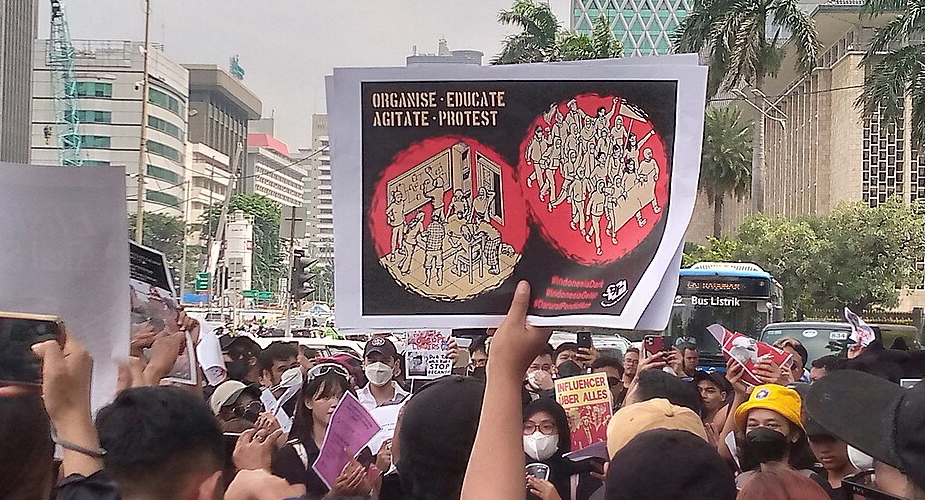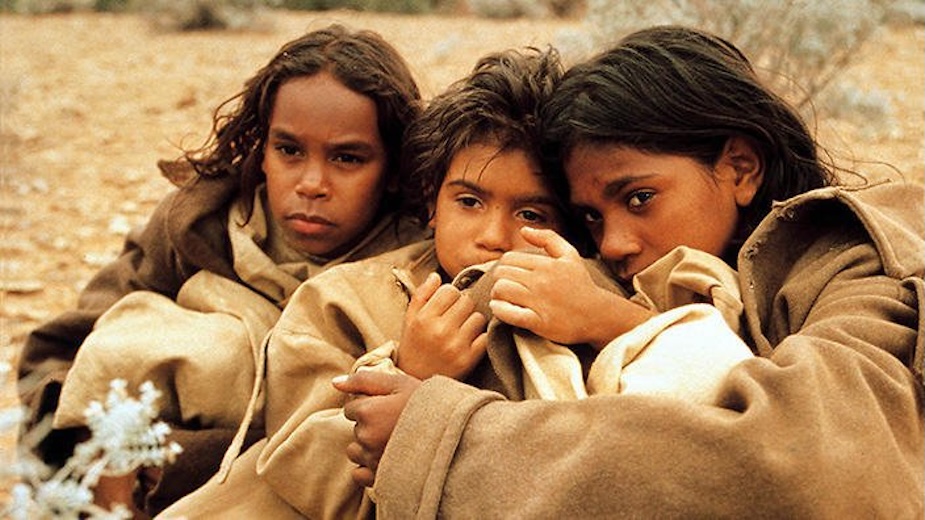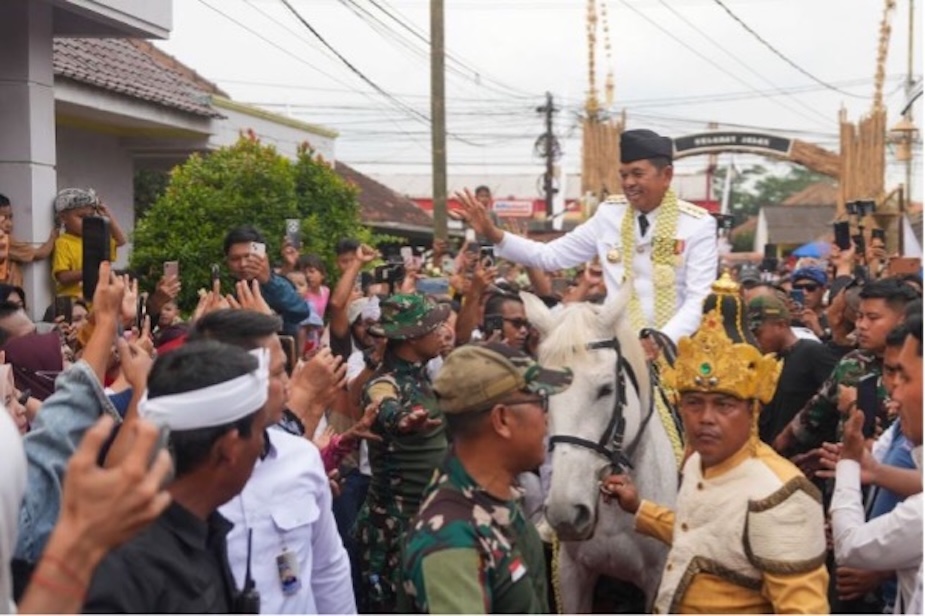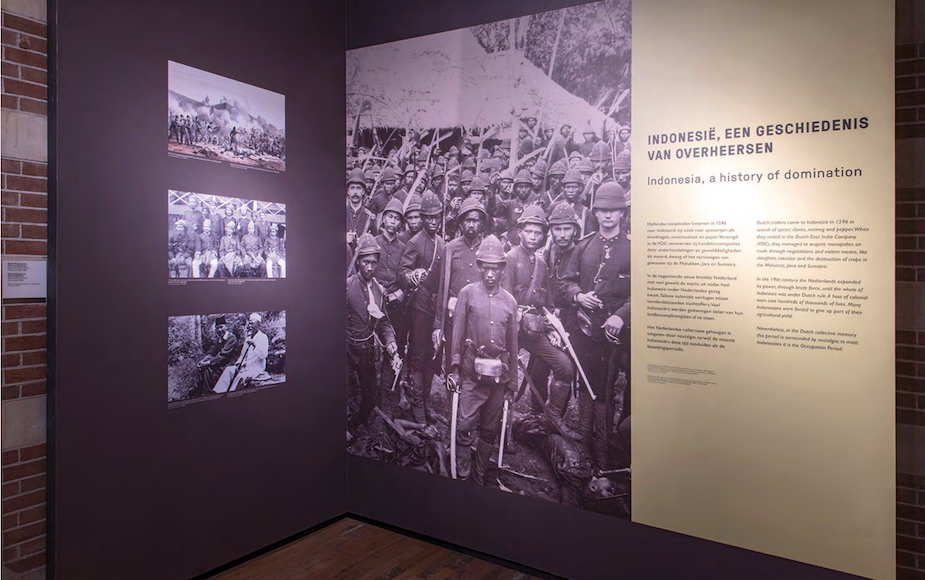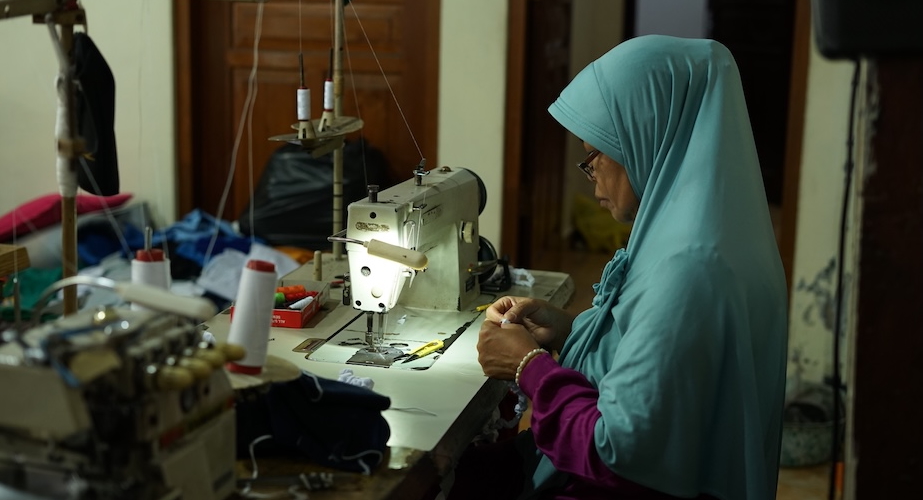This Indian film’s popularity reveals a popular critique of the US
Wil Mackey
Sharukhan's Indonesian fans outside his concert at Jakarta International Convention Centre (8/12/2012) Tribun Jakarta/ JePrima
When I arrived at Medan State University on an Indonesian government scholarship, my fellow classmates asked me: ‘Have you seen My Name is Khan?’ I hadn’t, and when I said so, they were surprised. They told me they thought everyone had already seen it. A few days later, we saw it together, and afterwards they asked me, ‘Wasn’t it great?’ I wasn’t so sure.
Even though My Name is Khan was released three years ago, in 2010, the film remains incredibly popular in Indonesia. Many Indonesians, like my classmates, have seen it multiple times.
But why?
Sure, the film is well made, and the cinematography is beautiful. The acting, too, is quite good and the story—about an Indian Muslim’s struggles in post-9/11 America—is touching. But the film, it seems, is popular for another reason: it tells the story of a pious Muslim who, despite anti-Islam sentiments, publicly practices his faith in the US. And that, for many Indonesians angry at the US’s post-9/11 foreign policy, is worth watching.
Fear and loathing in San Francisco
Directed by Karan Johar, My Name is Khan follows Rizvan Khan, played by Shah Rukh Khan, as he travels around post-9/11 America. Born in India, Rizvan, who has Asperger’s Syndrome, learns an important lesson from his mother: there aren’t Muslims or Hindus or, for that matter, Jews or Christians. There are only good people and bad people. Taking the lesson to heart, Rizvan moves to America after his mother’s death. In San Francisco, he ends up living with his brother and falling in love with Mandira (Kajol Devgan), a divorced single mother and a Hindu.
Eventually, they wed. But their happiness is short-lived. After the 9/11 attacks, they become the targets of anti-Muslim racism, and when a racially charged tragedy befalls their family, a distraught Mandira kicks Rizvan out of the house. He can’t return, she screams, until he has met with the US President and said, ‘My Name is Khan and I’m not a terrorist.’
The movie, distributed by Fox Star Entertainment in 2010, was a huge success in Indonesia, earning US $1.8 million. Within three weeks, ticket sales had increased 300 per cent, and to accommodate the growing demand, the number of Indonesian theatres screening the film jumped from six to seventeen. Three years on, it is impossible to know the film’s total viewership – especially since pirated versions of the film can be easily downloaded –but most Indonesians have seen the film, or at least heard of it.
Enthusiastic India-philes
Indian cinema is nothing new in Indonesia. During the 1950s and 60s, when Western influences were officially frowned upon, Indonesian singers incorporated elements of Indian musicals into their performances. Famous Javanese dangdut singer, Ellya, admired musical scores from Indian films and incorporated their rhythms into her music. The result was a hit, and other Indonesian musicians, such as the Sonata Group, followed her lead, using Indian-inspired rhythms and harmonies in their music.
In the 1970s, Indonesians remained enthusiastic consumers of Indian film and music. The Indian film star Amitabh Bachan wielded great influence on the performance and singing style of the dangdut singer, A Rafiq. Another dangdut singer, the famous Rhoma Irama, incorporated Indian sounds into his music. His group, Sonata, formed in 1971, used Indian melodies and harmonies, synthesising Melayu and Indian music in a new and distinctive Indonesian sound that many Indonesians loved
In contemporary Indonesia, there has been no let-up in the fervour for Indian film. In Jakarta, numerous Bollyood-inspired clubs have popped up. One Bollywood fan, Herri Rahul Burma, created a Bollywood dance studio, and others have founded fan clubs. Members collect pins and posters. Some even make t-shirts, emblazoned with their favourite star’s picture.
A relatively new star, Shah Rukh Khan (otherwise known as King Khan) has assumed the legendary status once enjoyed by Amitabh Bachan. Khan may not be a household name outside South and Southeast Asia, but he certainly is in Indonesia. He is, in the eyes of many Indonesians, just as famous as Britney Spears.
Khan is not only famous for his acting and singing abilities, but also for his faith. For many Indonesians, Khan is an inspiration. As a moderate, yet still devout, Muslim, he does not hide his faith before the media. On the contrary, he admits that it is an important part of his identity. And to satiate the public’s interest, the Indonesia’s media closely follows Khan’s spiritual life. Last year, Tempo, one of Indonesia’s most respected news magazines, reported on Khan’s plan to return to his home for Idul Fitri. ‘I will return home to celebrate Idul Fitri, honour our God, and all the usual things we do during this important time of year,’ Tempo quoted Khan as saying.
Why did this happen to us?
‘We worry that the US looks at Indonesia and only sees jilbabs and radicals,’ says Deasy, a radio announcer. Deasy is not alone. Many Indonesians share her concern, and in the film, that concern is only reinforced. In the film’s most disturbing scene, Rizvan’s sister-in-law is attacked at her work place, and her jilbab is ripped from her head. The close-up scene, which is shown through the eyes of a faceless attacker, is intensely personal. Following the attack, she agonizes with her husband over whether or not to wear the jilbab. Tearfully, she decides to keep it off. Displaying her faith, she and her husband decide, is simply too dangerous in post-9/11 America.
The film also depicts the 9/11 attacks as a Muslim tragedy, not as an American one. After the attacks, which the movie does not show, Rizvan and his family become targets of anti-Muslim racism. In one particularly powerful scene, Rizvan and his wife attend a 9/11 vigil. They move towards the centre of the crowd, but as they do so, whispers are heard. The other mourners look at them, mumbling to one another, and shuffle away. Soon Khan and his wife are standing removed from the rest of the crowd.
As shown by the film, many other Muslims in America experience much worse. A car tries to run down a turbaned man and his daughter; a Muslim-owned shop is ransacked as its owner looks on helplessly; and in a school, a teacher tells her students, one of whom is Rizvan’s son, that Islam is the most dangerous and violent of the world’s religions. As Rizvan writes in his dairy following the 9/11 attacks: ‘Why did this happen to us?’
It is, for many Indonesians, an apt question. Many Indonesians still feel that the 9/11 attacks were carried out by non-Muslims, and they chaff at anyone who suggests otherwise. According to a World Opinion Poll, 77 per cent of Indonesians believe that the 9/11 attacks were an anti-Muslim conspiracy, and they are angry at the responses of US government and its citizens to the tragedy.
My Name Is Khan only reinforces those perceptions. Bush’s administration is depicted as anything but pro-Muslim in the film. When Rizvan tries to meet with the President at a fundraiser, he is informed that the function is for Christians only. Later on, at a Bush rally, the film jumps from one rooftop to another, showing armed and grimacing Secret Service agents monitoring the crowd below. And after Khan, who is standing amid a crowd of Bush supporters, shouts to the President: ‘My Name is Khan, and I’m not a terrorist,’ he is beaten by Secret Service agents and later locked up in a Guantanamo-style cell.
Public opinion reflected
For Indonesian viewers, Rizvan’s treatment is not surprising. It supports their views of the US and how its government treats Muslims. After the US-led War on Terror, Indonesians’ confidence in America and its intentions nose-dived. As a Pew Poll from 2003 showed, following the US-led invasion of Iraq, 83 per cent of Indonesians had a negative view of the US. A startling majority, particularly since one year prior, the same poll showed that only 36 per cent of Indonesians had an unfavourable view of the US.
The film, too, mirrors Indonesian public opinion regarding US President Obama’s election. Whenever Obama appears in the film, the music swells and cheering fans – black, white and taqiyah-wearing Muslims – fill the screen. With Obama, Rizvan finally has the opportunity to meet with the President. ‘My name is Khan, and I’m not a terrorist,’ he says. Obama, holding Rizvan shoulder, replies, ‘I know.’
However far-fetched, this scene captures the hope felt by many Indonesians following Obama’s election, that he would single-handedly improve US-Muslim relations. Following his election, a Pew Poll showed that 71 per cent of Indonesians thought Obama would do the right thing in world affairs, and 61 per cent believed that he would consider the interests of Indonesia while making foreign policy decisions. Three years later, Indonesians’ enthusiasm for Obama had waned. Since 2008, according to a Gallup Poll, the percentage of Indonesians, who approve of Obama’s performance, has fallen from 46 per cent to just 38 per cent. Many Indonesians, once again, are wary of the US and its foreign-policy objectives, and My Name is Khan, tellingly, remains as popular as ever.
Wil Mackey is a former student at Medan State University.
Inside Indonesia 112: Apr-Jun 2013{jcomments on}




